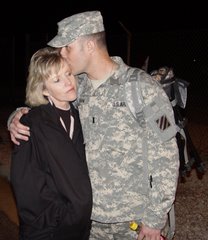
Iraqi to Return Home, As a U.S. Soldier
By CLARKE CANFIELD
LEWISTON, Maine (AP) — Safaa Wadi moved to this former mill city after his life was threatened in his native Iraq while serving as an interpreter for the U.S. Army. He expects to soon head back to Iraq — not as a civilian interpreter, but as a U.S. soldier.
Wadi arrived in the United States in September with a special immigrant visa for Iraqi and Afghan interpreters. But with his savings nearly depleted and unable to land a decent job, Wadi enlisted in the Army. He begins training in South Carolina on Monday.
Wadi isn't worried about returning to Iraq, where many of his countrymen considered him a traitor because he worked with American forces. His allegiance is now to the United States, he says.
"I want to serve this country because this country returned to me my life," Wadi said. "If I had stayed in Iraq, I'd be dead now."
In the modest two-bedroom apartment Wadi shares with three other Iraqi immigrants, the walls are bare except for photos taken in the Iraq desert of him and other interpreters with U.S. soldiers, all dressed in military fatigues. He points to a fellow Iraqi interpreter who is smiling for the camera — "He was killed," he said.
Iraqi interpreters working for U.S. forces often face grave danger. They receive instant messages on their cell phones threatening harm to them or their families. Some of their cars get blown up. Some get shot. Some are killed.
The United States responded by increasing from 50 to 500 the annual number of interpreters from Iraq and Afghanistan who were allowed to immigrate here in the last two fiscal years. Wadi jumped at the chance, becoming one of 1,880 applicants for the slots, immigration officials say.
Through the program, he and 13 others have moved to Lewiston and neighboring Auburn, ready to live the American dream. For many, though, the realities of life in the U.S. have fallen short of their hopes.
The men — some single, others married with children — have had a hard time finding work. There's no market here for Arab interpreters, so they're learning to write resumes, network with potential employers and apply for other jobs.
Nationwide, hundreds of interpreters who worked as engineers, bankers, doctors, teachers and other professions are having a tough go of it, said Francie Genz, outreach coordinator with Upwardly Global. The San Francisco-based nonprofit helps professionals re-establish themselves in the U.S.
Some of the immigrants face a daunting choice: stay in America and work low-wage jobs at fast-food restaurants or warehouses, or return to Iraq for high-paying — but dangerous — jobs as interpreters for military contractors.
"It's kind of a shameful predicament that that's their choice," Genz said.
On a snowy February day in Lewiston, the 28-year-old Wadi speaks in fluent English about life in Lewiston, where he lives in a run-down tenement house.
Wearing a Boston Red Sox cap, a Nike workout outfit and New Balance athletic shoes, he mentions that he likes shopping at Wal-Mart and Staples. Reality cop shows and "Deal or No Deal" are among his favorites on TV. He likes country music, especially Johnny Cash.
He shares an apartment with three other men in their 20s — Khalid, Majid and Sattar, who don't want their full names published out of fear for their families back home.
Few people in Iraq know they are in the U.S., they say. Instead, people in Iraq think they are attending school or working jobs in India, Egypt, Sweden, Canada or elsewhere.
In Iraq, they studied at the university level and owned homes and cars. Here, they can't find jobs, share cramped apartments and have trouble getting around because public transit is minimal.
One of Wadi's housemates, Majid, has found a job at a visa processing center in New Hampshire. The pay is low, but it's a start, he says.
Two other Iraqis who live in Auburn, across the Androscoggin River, got jobs at a sauce-processing plant. But they were let go a week later when they were late for work because their taxi was delayed by a snowstorm.
Even with such obstacles, they've resisted the temptation to return to Iraq as interpreters. It's just not safe, they say.
One of the interpreters who moved to Maine survived a sniper attack while driving in Iraq, but a fellow interpreter in the passenger seat wasn't so lucky.
Wadi decided last summer the time had come to leave Iraq. Now he says the time has come to put on a uniform. In a matter of days, he'll be Army Specialist Wadi. "I think I'm the first guy to do this," he said.
Upwardly Global and an Army spokeswoman said they weren't aware of any other Iraqi interpreters joining the Army. But they would be welcome to do so because enlisting would give them good benefits and put them on the path toward U.S. citizenship while filling a need for the Army, Lt. Col. Anne Edgecomb said.
Wadi expects to be used as an interpreter again when he returns to Iraq. He plans to put in four years in the military.
"After the Army," he said, "I hope to go to an American university, get a job and be a productive citizen."





No comments:
Post a Comment